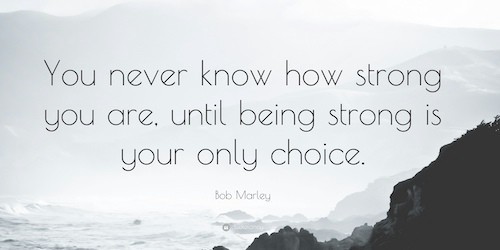What doesn’t kill you, only makes you stronger.
During times of hardship, our brain defaults to logical thinking. That behavior is not so handy, as obvious solutions can be more dangerous than the problem.
That’s why the Royal Air Force was caught by surprise by Abraham Wald’s recommendation to one of World War II biggest challenges.
The statistician was hired to help the British decide where to add armor to the RAF bombers. His counterintuitive solution saved more lives than any logical approach would.
Wald didn’t advise adding armor where the bullet holes were. Against all conventional wisdom, he recommended protecting those places that have not been hit.
The mathematician simply wondered where the “missing bullet holes” were. He realized that they were on the missing planes. The British bombers that were shot down were most probably hit in the engine. That’s why they didn’t come back.
While everyone’s logic was to protect the area that was hit, Wald focused on which bullets holes caused a plane to crash.
Unconventional wisdom — embracing a counterintuitive mindset — helps us bounce back. And not just in times of war.
Embrace a Counterintuitive Mindset
“We all wish to touch the bench on which we see a ‘wet paint’ sign.”
If less is more, then more is less, right?
Yet, our logic is illogic.
We work countless hours even if doesn’t increase our productivity. We manage more than one project at a time even if it slows us down. We expect people to provide an objective perspective but they are not.
That’s because we believe logical thinking generates extraordinary results.
Do you fall into that trap too?
Let’s borrow some inspiration from science.
Heavy things don’t fall faster than lighter ones. Objects in motion tend to stay in motion. Blunt-shaped bodies are more efficient than streamlined shapes when returning to Earth from space.
Most scientific theories seem counterintuitive. They go against common sense. Great scientists are similar to entrepreneurs. They have to fight the system to sell their breakthrough ideas.
Successful leaders embrace counterintuitive behaviors too.
Questioning everything, playing, experimenting even if they fail and keep on playing. Great leaders work on closing the gap between “conventional wisdom” and real experience.
This fresh perspective allows them to come up with surprising solutions. If no one had challenged logical thinking, your phone would just be used to make calls.
Being counterintuitive requires you to behave in a way that seems like it shouldn’t make sense. But it actually does.
Take germs, for example. Our society is so “hygiene-oriented” that is has made our immune systems weaker rather than stronger. By avoiding kids exposure to germs, we have increased the amount of self-immune conditions.
A counterintuitive mindset is a superpower. Use it to reframe problems when dealing with adversity.
How Resilience Works. And Why it Matters.

Resilience is not just about being strong, it’s about having a different perspective.
Rather than focusing on the problem, channel your energy on what you can do about it.
Bouncing back leaves no room for complaints. It’s about taking ownership and action.
Resilience: noun. The ability to become strong, healthy, or successful again after something bad happens.
Your ability to bounce back has nothing to do with your genes or smarts.
Being resilient is a mindset. It can be built and trained.
Diane Coutu, author of “How Resilience Works”, after researching many theories, concluded that resilient individuals share three unique traits:
- a resolute acceptance of reality (adaptability)
- a sense that life is meaningful (purpose)
- an uncanny ability to improvise (creativity)
After Hurricane Andrew devastated the Florida region in 1992, many people were living in their cars. That didn’t stop UPS to continue delivering parcels to those who lost their homes, as explained by Coutu.
UPS’ sense of purpose — to deliver all packages no matter what — and an acceptance of reality helped its employees improvise.
The delivery company’s well-oiled machine enabled unconventional thinking. And helped develop a creative solution to deliver mail to those living in their cars.
“What doesn’t kill you, only makes you stronger.” — Friedrich Nietzsche
Nature is a perfect testament of how counterintuitive behaviors build resilience. Take native prairies for example. They are not only not hurt by fire, but actually, need it to survive.
Most prairie seeds need to be exposed to sunlight and warm temperature to sprout. Fire clears away dried plants that shade the soil.
Do you wish you could avoid fire drills in our life?
Instead of complaining about what goes wrong, embrace a bigger purpose: to flourish, not just survive. Just like nature does.
The bur oak is often one of the only trees found in a native prairie. Its thick corky bark makes it resistant to wild fires.
Learn from nature.
Develop a thick skin that is stronger than fire.

Daily Stretch: Silence Logic to Bounce Back
“Resilient people have very sober and down-to-earth views of those parts of reality that matter for survival.” — Diane Coutu
Today’s stretch exercise is about silencing your logic. And let counterintuitive behaviors help you bounce back.
“Who didn’t make it out of the camps?” — Jim Collins, author of Good to Great, asked a Vietnam vet.
“The optimists.” — the veteran replied.
Important to note that the man has been imprisoned and tortured by the Viet Cong for eight years.
The usual thinking is that we should be afraid of our captors. A counterintuitive behavior is being optimistic instead. To focus on surviving and, most importantly, on the day after being released.
Your dreams will keep you moving forwards when things go wrong.
As I mentioned earlier, resilience is not something that we are born with. The ability to bounce back from harsh times is a skill. And as such, needs to be developed and mastered over time.
You don’t need to wait for life to put you against the ropes.
Create your own experiences to test your strength and ability to bounce back.
1. Say no to quick and easy wins:
“When it comes to success, there are no shortcuts.” — Bo Benett
Taking the easy way out, like shortcuts, weakens your spirit. The past of least resistance will take you nowhere, as I wrote here.
Real success requires preparation, effort, and persistence. Choosing the right path requires courage. It also tests your conviction. Pursuing what you really want, makes you stronger.
2. If you are tired, keep going:
“It’s always too early to quit.” — Norman Vincent Peale
Exercising sore muscles might help reduce the soreness.
The same happens when working on a new project. The more you feel you want to quit, the closest you are to succeeding.
Don’t give up. Physical strength and mental strength feed off of each other.
3. The less you know about the danger, the better:
“What’s coming, will come. And we’ll meet it when it does.” — Hagrid
Flooding people with information doesn’t help them understand the problem. Ignoring information can make you wiser instead.
Like the British statistician who didn’t care where the bullet holes were. Instead of focusing on protecting where the planes have been hit, he solved for the “missing holes”.
4. Failing removes the fear of failure:
“If you are not prepared to be wrong, you’ll never come up with anything original.” — Ken Robinson
Build a habit of failing. Stretch beyond your comfort zone. Experiment early and frequently.
Turn failure into a practice to build resilience. The more you are used to dealing with failure, the less failure will hurt you.
5. Embrace reality, even if it hurts:
“Face reality as it is, not as it was or as you wish it to be.” — Jack Welch
People who are resilient tend to be flexible.
We avoid reality when it hurts. But running away from suffering is playing in defense mode. Learning to manage your stress — to adapt to reality rather than rejecting it— will make you stronger.
Embracing reality helps you build a problem-solving mentality.
When dealing with adversity, it’ll help you shift from one coping strategy to another. Adaptability is about focusing on the solution, not the problem.
6. Seek out resistance:
“Always seek negative feedback, even though it can be mentally painful.” — Elon Musk
Turn dealing with resistance into a habit.
Opposition will always exist. Facing it will test your commitment to achieving what you want. Enemies keep you on your toes and help improve your ideas.
7. To achieve something, don’t set goals:
“These days, however, I live without goals, for the most part. It’s absolutely liberating, and contrary to what you might have been taught, it absolutely doesn’t mean you stop achieving things.” — Leo Babauta
Too much planning wires our brains to focus on our expectations (“goals”) rather than our reality. Freeing your mind will leave room for the unexpected.
Instead of resisting reality, you can use what you get to achieve what you want.
Remember. Adversity is like fire.
It can kill you or make you stronger.
Before You Go
Change happens one stretch at a time. Like being counterintuitive to build resilience.
Logical thinking gets teams stuck. Learn how to counterintuitive behaviors can make teams more productive. Check out our workshop: “Reboot your Team: How to Overcome Being Stuck.”
Other resources to improve your resilience
- Read my book “Stretch for Change”
- Check our change leadership programs
- Follow me on Medium
Originally published at medium.com


